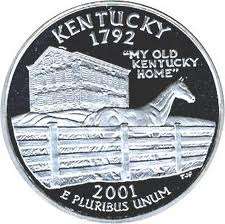PPA Sues to Join PokerStars Battle Against Kentucky
The US state of Kentucky’s ongoing war against international online-gambling companies has taken a new twist, with the Washington DC-based Poker Players Alliance filing its own joinder in a Kentucky-based case which the state originally brought against bwin.party (parent company of PartyPoker) and PokerStars five years ago.
 The situation remains fluid, with some uncertainty existing as to whether the PPA was successful in its initial filing, a countersuit against the state of behalf of the state’s roughly 14,000 PPA members.
The situation remains fluid, with some uncertainty existing as to whether the PPA was successful in its initial filing, a countersuit against the state of behalf of the state’s roughly 14,000 PPA members.
According to PPA Executive Director John Pappas, “This is a cynical big government money grab of private consumer dollars to pay for political excesses. This entire lawsuit is based on a long-shunned 19th Century sore loser statute, which is about as applicable today as the anti-dueling laws still on the books. The Commonwealth has spent countless resources and time figuring out how to extort money from online poker companies when they could have spent that time creating a safe and regulated market that would have raised equal or greater amounts of money to benefit the consumers and taxpayers of the Commonwealth both now and in the future. The affected players should be the ones who collect from this suit, not the government and certainly not the attorneys.”
A second statement distributed by Amaya, Inc., the current parent company of PokerStars, congratulated the motion filed by the PPA to join the case that Kentucky officials continue to press against PokerStars. According to Eric Hollreiser, Amaya’s Vice President of Corporate Communications:
“We welcome the intervention of the Poker Players Alliance to this suit and believe they represent the true interests of Kentucky residents and Kentucky poker players. While we do not believe the suit has merit and will continue to pursue the case in the courts, if there is a monetary judgement it should go toward the consumers who played on PokerStars and not to line the pockets of opportunistic plaintiff’s attorneys.”
Kentucky’s attempts to whitemail the international online-gaming community have marched on for more than seven years. Back in 2008, the office of Kentucky Governor Steve Beshear, spurred on by a third-party legal firm, sought to seize 141 domains associated in some form with online gambling. That suit proved largely fruitless (the state did win a couple of small settlements from gambling firms that had unwisely used US-based registrars), and eventually brought the state into conflict with the US’s federal-level Department of Justice when the DOJ filed its 2011 “Black Friday” case.
Kentucky, in 2010, with its seizure efforts largely laughed at by the rest of the world, tried a second time against online giants PokerStars and PartyPoker. That’s the ongoing lawsuit that the PPA’s motion seeks to join, on behalf of PokerStars as well as Kentucky players; PokerStars has long been a prominent supporter of the PPA. PartyPoker parent bwin.party — originally PartyGaming when the 2010 lawsuit was filed — bought its way out of the lawsuit with a $15 million whitemail payment to Kentucky in 2013.
That left PokerStars as the sole defendant in the Kentucky action. Whether or not bwin.party’s 2013 settlement was like its similar federal-level payoff and was partly a “poison pill” payoff aimed at PokerStars future US-aimed marketing remains up for debate. However, the action by Kentucky continues to pose an ongoing legal threat to PokerStars planned return and expansion to those US plans in some states, even though Amaya has already received approval from New Jersey officials to use the PokerStars brand there.
Kentucky even tried to attach the federal settlement that the DOJ received from PokerStars in 2012, finally receiving a $6 million “go away” payment from the DOJ in exchange for agreeing to drop an action that threatened to stall the ongoing refunds of Full Tilt funds to US players. (PokerStars had agreed to acquire all assets of Full Tilt in exchange for providing the funds to refund those former FTP players.)
PokerStars and its then-parent Rational Group, admitted no wrongdoing in finally agreeing to the settlement which allowed Kentucky’s whitemail to partly succeed. However, Kentucky also refused to drop its ongoing right to pursue PokerStars for additional whitemail payoffs for its earlier activity serving Kentucky residents, which resulted in the second action that the PPA sought to join this week.




















COMMENTS